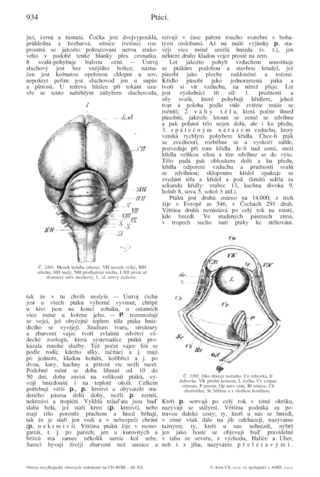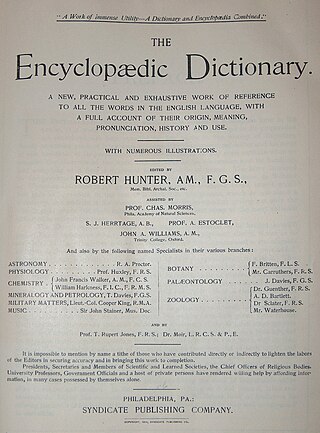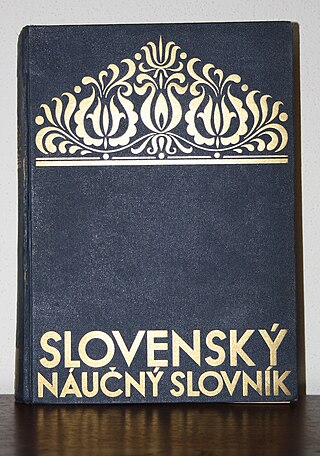
John Fiske was an American philosopher and historian. He was heavily influenced by Herbert Spencer and applied Spencer's concepts of evolution to his own writings on linguistics, philosophy, religion, and history.

The Century Dictionary and Cyclopedia is one of the largest encyclopedic dictionaries of the English language. In its day it was compared favorably with the Oxford English Dictionary, and frequently consulted for more factual information than would normally be the case for a dictionary.

Otto's Encyclopedia, published at the turn of the 20th century, is the largest encyclopedia written in Czech. For its scope and the quality of the writing, it is comparable to the greatest world encyclopedias of its time, such as Encyclopædia Britannica.

Cyclopædia: or, An Universal Dictionary of Arts and Sciences is an encyclopedia prepared by Ephraim Chambers and first published in 1728; six more editions appeared between 1728 and 1751 with a Supplement in 1753. The Cyclopædia was one of the first general encyclopedias to be produced in English.

Chambers's Encyclopaedia was founded in 1859 by William and Robert Chambers of Edinburgh and became one of the most important English language encyclopaedias of the 19th and 20th centuries, developing a reputation for accuracy and scholarliness that was reflected in other works produced by the Chambers publishing company. The encyclopaedia is no longer produced. A selection of illustrations and woodblocks used to produce the first two editions of the encyclopaedia can be seen on a digital resource hosted on the National Museums Scotland website.
The English Cyclopaedia: A new dictionary of universal knowledge, was published by Charles Knight, based on the Penny Cyclopaedia, of which he had the copyright. He was assisted by Alexander Ramsay and James Thorne. It was sometimes popularly referred to as Knights Encyclopedia.

Francis Hindes Groome was a writer and foremost commentator of his time on the Romani people, their language, life, history, customs, beliefs, and lore.

The Brockhaus and Efron Encyclopaedic Dictionary is a comprehensive multi-volume encyclopaedia in Russian. It contains 121,240 articles, 7,800 images, and 235 maps. It was published in the Russian Empire in 1890–1907, as a joint venture of Leipzig and St Petersburg publishers. The articles were written by the prominent Russian scholars of the period, such as Dmitri Mendeleev and Vladimir Solovyov. Reprints have appeared following the dissolution of the Soviet Union.

An encyclopedic dictionary typically includes many short listings, arranged alphabetically, and discussing a wide range of topics. Encyclopedic dictionaries can be general, containing articles on topics in many different fields; or they can specialize in a particular field, such as art, biography, law, medicine, or philosophy. They may also be organized around a particular academic, cultural, ethnic, or national perspective.

D. Appleton & Company was an American publishing company founded by Daniel Appleton, who opened a general store which included books. He published his first book in 1831. The company's publications gradually extended over the entire field of literature. It issued the works of contemporary scientists, including those of Herbert Spencer, John Tyndall, Thomas Huxley, Charles Darwin, and others, at reasonable prices. Medical books formed a special department, and books in the Spanish language for the South America market were a specialty which the firm made its own. In belles lettres and American history, it had a strong list of names among its authors.
The 12-volume Universal Cyclopaedia was edited by Charles Kendall Adams, and was published by D. Appleton & Company in 1900. The name was changed to Universal Cyclopaedia and Atlas in 1902, with editor.
The Popular Encyclopedia or Conversations Lexicon was a British encyclopedia that was published from 1837 to 1893 by Blackie and Son, of Glasgow. It was originally a reprint of Francis Lieber's Encyclopedia Americana, itself based on the Brockhaus Enzyklopädie.
Cyclopedia, cyclopaedia and cyclopedien are archaic terms for an encyclopedia.

Encyclopedias have progressed from the beginning of history in written form, through medieval and modern times in print, and most recently, displayed on computer and distributed via computer networks.

The Slovenský náučný slovník is the first general encyclopedia in Slovak. It was published in 1932 in three volumes.